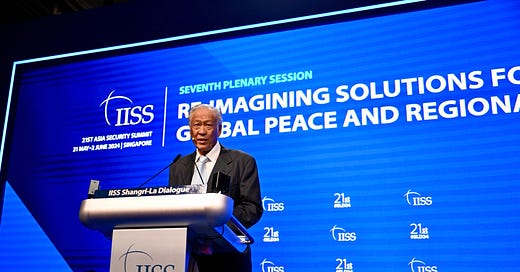Singapore Defense Minister Berates US
"US has now willy-nilly – the image has changed from liberator to great disruptor to a landlord seeking rent."
China In Arms BOOKSTORE and GIFT SHOP!
Subscribe: $5 Month/$50 Annual (unable to secure a subscription contact the bank for permission for Stripe deposits).
Paid Subscriptions can choose 2 free books.
9 March 2025 (Sunday)
Singapore Defense Minister Berates US
“US has now willy-nilly – the image has changed from liberator to great disruptor to a landlord seeking rent.”
By Wendell Minnick (Whiskey Mike) 顏文德
TAIPEI - In [brackets] are my comments/observations.
SINGAPORE - MINISTRY OF DEFENSE:
Remarks By Minister For Defence Dr Ng Eng Hen [2011 to Present] at the BMW Foundation Herbert Quandt Annual Leaders Roundtable, “On The Horns Of A Trilemma: Geopolitical Recession, Technological Leadership And Energy Security” On 14 Feb 2025:
Minister Rasmussen, Fellow Speakers,
Distinguished Guests, Ladies and Gentlemen,
It is clear to all of us that we live in quite interesting times, that the assumptions that we have undertaken in last 80 years have now fundamentally changed. So that's the starting point.
The US is the moving spirit behind most of the post-World War II constructs, together with its alliance, particularly for globalisation based on inclusive free trade. We signed a free trade agreement with the US some years ago. But now I am sure you have your own characterisations of what American foreign policy is, but in my mind, it is that America's primacy has become the overriding consideration. Not that it never was, but I think that it has now become the Pole Star [North Star; a reference to guidance] of foreign policy, even at the expense of bilateral ties or multilaterals. It is a great disruption, so we have got to recognise that. How countries and regions respond to this significant shift in US foreign policy bears watching.
Now we can talk about what the world will be like moving forward, but I think in any scenario, China will be a key player, and that the US-China relationship will be all important. There will be an impact on trade for all countries, this is a given. It is just a question of how much more. And some figures in the last trade war under President Trump, between 2018 and 2019, bilateral trade between the US and China fell about 10%. Europe imposed tariffs to correct trade imbalance with China and the trade deficit did come down in 2023. Figures came down from about €396 billion to about €292 billon, but Europe's real GDP growth fell from 3.5% to 0.4%. Not entirely due to that, but those are the figures. Now there are fresh salvos of tariffs from the US omni-directionally. The question is how much our trade will be affected. It has been said that trade and security are two sides of the same coin, and one assumes that as trade dependencies shift, security alliances will follow. Let me just give some metrics in terms of Asia and I will situate the appreciation to Asia. For Asia, the US in the last 60 years since President John F. Kennedy's inaugural speech – that one form of tyranny (colonial control) will not be replaced by an iron tyranny, that was the moral legitimacy in which US presence was in our region.
US has now willy-nilly – the image has changed from liberator to great disruptor to a landlord seeking rent.
Remember we, in ASEAN, became these democratic countries fairly recently. Most gained independence in the 1960s and 70s, not so long ago. Brunei gained independence only in 1984, so they are young democracies. And I think any major shift in this great power balance is likely to alter the trajectory of ASEAN.
Collectively, ASEAN as a group of 10 nations [Brunei - Unitary Islamic absolute monarchy; Cambodia - Unitary parliamentary constitutional elective monarchy under a hereditary dictatorship; Indonesia - Unitary presidential republic; Laos-Unitary Marxist–Leninist one-party socialist republic; Malaysia - Federal parliamentary constitutional elective monarchy; Myanmar - Unitary assembly-independent republic under a military junta; Philippines- Unitary presidential republic; Singapore - Unitary parliamentary republic controlled by one party; Thailand - Unitary parliamentary constitutional monarchy; Vietnam - Unitary Marxist–Leninistone-party socialist republic], has about 700 million people, and a combined GDP of about 4 trillion, the fifth largest in the world.
So in this indeterminate phase, in the absence of a leader to protect our global commons, I think we must all expect that the progress and well-being of the global commons will suffer. To me, that is a given. It is just how much. That includes any global regime to deal with climate change. That includes any system that wants to deal with other aspects.
On the other hand, if you look at China, it is 80% of the world’s solar manufacturing capacity, and more than half of EVs (Electric Vehicles) produced worldwide are Chinese made. And I think this dichotomy going forward between the US and China will put pressure on trade and security.
Let me end by asking questions – who, if anyone, any one country or region or bloc, can step in if US declines to protect the global commons and how effective, and against what resistance.
Overall, the speech is quite unusual for a Singapore defense minister compared to past statements. Singapore’s defense ministry has close military relations with both Israel and the United States. Most of the big US defense contractors have significant representation in Singapore: Boeing, Lockheed Martin, Northrop Grumman, etc.
Singapore is considered one of the big four defense spenders for U.S. products: Japan, South Korea, and Taiwan.
Singapore has both the Lockheed F-16 and Boeing F-15 fighters and has on order both the stealth Lockheed F-35A conventional take-off and landing (CTOL) and F-35B short take-off and vertical landing (STOVL) fighter aircraft, along with the Boeing P-8A Poseidon Maritime Patrol and Reconnaissance Aircraft.
Also in Singapore’s inventory are the Boeing AH-64 Apache Longbow Attack Helicopter, Lockheed C-130 Hercules Cargo Aircraft, Boeing CH-47 Chinook Cargo Helicopter, Boeing KC-135R Stratotanker aerial refueling aircraft, and Sikorsky S-70B Seahawk.
Singapore also hosts three of the most important trade and defense conferences/exhibitions in Asia that are required attendance for regional and US Tier One government and corporate entities in the defense world: Shangri-La Dialogue, Singapore Airshow, and International Maritime Defense Exhibition (IMDEX).
During past IMDEX expos I have been given tours of two Chinese naval vessels; a rare opportunity to board vessels belonging to the People’s Liberation Army Navy (PLAAN).




